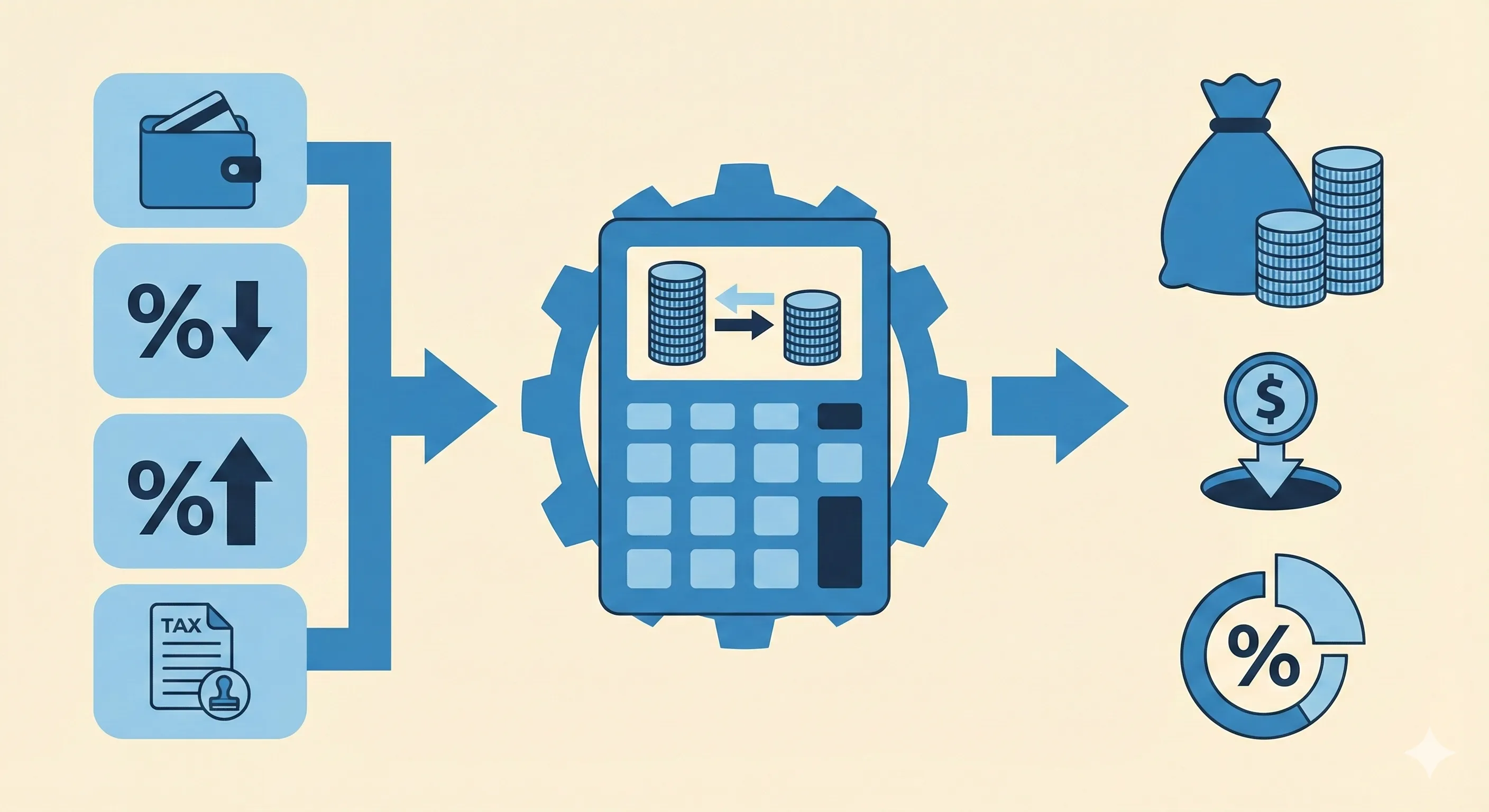Idle Cash Drag Calculator - Tool

What the Calculator Is Designed to Do
The Idle Cash Drag Calculator is a diagnostic tool, not an investment recommendation engine. Its purpose is to illustrate how differences in yields may affect cash balances over time. Instead of guessing how much income is being forgone, the calculator estimates the difference between what an investor earns now and the user-entered comparison yield, such as money market funds or high-yield savings rates, as of a given date. such as money market funds or high-yield savings.
By presenting these differences as both a total dollar figure and a percentage of the balance, the calculator provides a simplified illustration of potential yield variation.
Key Takeaways
- The Idle Cash Drag Calculator highlights the difference between current yields and realistic target yields on cash balances.
- It adjusts for account type, showing how taxable and tax-advantaged accounts are affected differently.
- Results are presented in both dollar terms and percentages, making the impact easy to visualize.
- By quantifying these differences, the tool provides an educational perspective on how varying yields could influence outcomes.
Breaking Down the Inputs
Every section of the calculator has a role in clarifying how idle cash affects potential returns:
- Accounts (Cash Balances Only): Users can enter balances for checking, brokerage sweep cash, or retirement accounts. Each account is tagged as taxable or tax-advantaged, since that distinction shapes after-tax yield.
- Current Yield (Your Cash Now): This represents what the entered accounts are currently earning. For example, many sweep accounts in brokerage firms still pay under 0.5%.
- Target Yield: This is the benchmark the tool uses to estimate what cash could earn in a typical higher-yield option. For instance, high-yield savings accounts have recently offered 4% or more (Bankrate, 2025).
- Marginal Tax Rate: For taxable accounts, the calculator uses the investor’s marginal rate to determine the after-tax yield. For retirement accounts, the tool assumes pre-tax growth.
Each input connects directly to the real-world question: “If this cash were moved into a higher-yielding, but still liquid, option, what difference would it make annually?”
Track investments, cash, crypto, real estate, and liabilities in one dashboard for free.
Understanding the Outputs
The output dashboard of the Idle Cash Drag Calculator gives three key insights:
- Total Idle Cash: The sum of all balances entered.
- Annual Drag (After-Tax): The dollar amount of income forgone based on the difference between current and target yields.
- Drag as % of Balance: How much the drag represents as a share of the overall cash balance.
Alongside this, the calculator breaks down results by account type, showing how each category contributes to the overall difference.
- Hypothetical: An investor with $15,000 in checking, $25,000 in brokerage sweep cash, and $12,000 in an IRA cash account may see over $1,900 in annual drag. The largest source might be the brokerage sweep, where balances earn almost nothing while higher-yield options are readily available.
Why This Matters
The numbers from the calculator often surprise investors because the drag is invisible in day-to-day life. The estimated drag should be read as a sensitivity illustration, not as a required action or guaranteed outcome. Banks and brokerages rarely show “forgone interest” on statements, and the effect compounds year after year.
During the 2022 rate-hike cycle, for example, the Federal Reserve increased interest rates quickly, but many banks left deposit rates near zero. That gap meant billions in unrealized household income stayed with financial institutions rather than in depositors’ accounts.
This tool is intended to promote awareness and transparency by helping users explore how different yield assumptions can affect illustrative outcomes
This interactive tool is for educational purposes only. It provides a simplified illustration of the potential impact of holding idle cash relative to higher-yield alternatives. The calculations are based on user-entered inputs and assumptions about yields and tax treatment, which may not reflect actual market conditions, account rules, or individual circumstances. The output is hypothetical and is not a prediction, projection, guarantee, or estimate of future returns. Results may vary materially from real outcomes. Nothing presented here constitutes investment advice, financial advice, or a recommendation to buy, sell, or transfer any asset or to modify any account.
How optimized is your portfolio?
PortfolioPilot is used by over 40,000 individuals in the US & Canada to analyze their portfolios of over $30 billion1. Discover your portfolio score now:





.webp)
